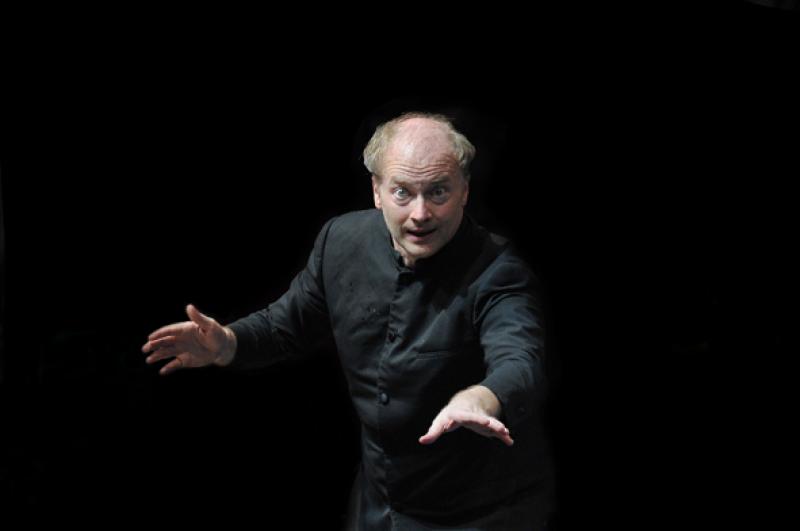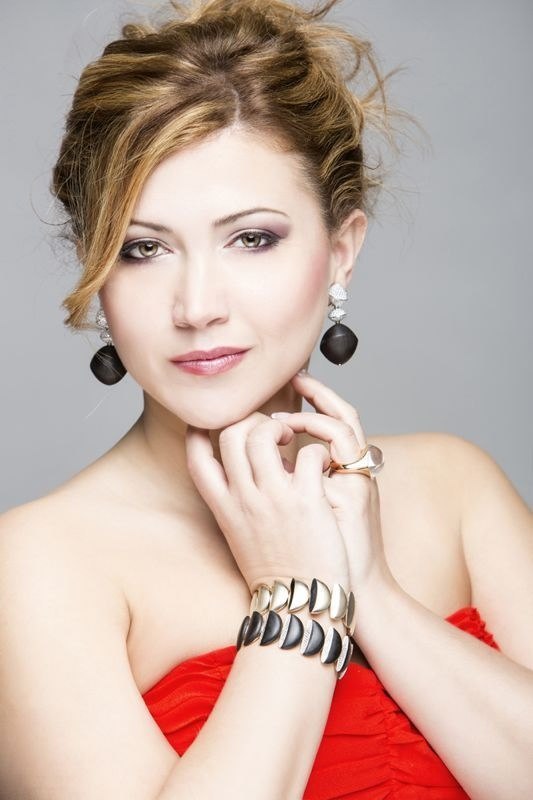Rigoletto, LSO, Noseda, Barbican | reviews, news & interviews
Rigoletto, LSO, Noseda, Barbican
Rigoletto, LSO, Noseda, Barbican
Orchestra home from Aix supplies all the effects for a conductor on a trampoline

This season opener was about closure too. The London Symphony Orchestra was back at the office last night, but this fresh stretch of concerts opened with an opera it has been performing while also acquiring a suntan in Aix-en-Provence. A new cast of singers replaced gaudy costumes and facepaint with elegant evening garb, and semi-acted their roles on the thin strip of forestage not occupied by the massed ranks of the orchestra.
The concept of the concert performance has never had more enthusiastic support than at the recent run of seven Wagner operas, amounting to a gazillion hours without anachronistic sets and look-at-me lighting. As with Wagner, the colour is all there in the music with the other bicentenarian Verdi, and without having to compete with Robert Carsen’s production replete with nudes and clown kit, the LSO took this opportunity to act out its part in the clash of cymbals, the moan of the oboe, the skip of the first fiddles. From the first dread chords of the brass, the sun-baked, storm-lashed streets of 16th-century Mantua were colourfully summoned.
 For this the audience has Gianandrea Noseda to clap on the back. Any anxiety that there’s not much to feast the eyes in a concert rendition of an opera was allayed by an athletic, even gymnastic performance from the Milanese conductor. From his apprenticeship in St Petersburg under Gergiev, he has spent much of his career in the pit, where there is presumably less room to dance and pivot, crouch and jerk like a demented trampolinist than there was here. For half this performance his sharp features radiated intense immersion in the drama as the Gilda of Desirée Rancatore (pictured © Allegri) fell in love for the first time, Dimitri Platanias's Rigoletto bemoaned the theft of his daughter and Saimir Pirgu’s nonchalant Duke hymned the flightiness of womankind. Famously committed, Noseda outgunned himself so that in the pause between the second and third acts, he looked for all the world like a knackered boxer staggering back to the ringside corner to recuperate. Magnificent.
For this the audience has Gianandrea Noseda to clap on the back. Any anxiety that there’s not much to feast the eyes in a concert rendition of an opera was allayed by an athletic, even gymnastic performance from the Milanese conductor. From his apprenticeship in St Petersburg under Gergiev, he has spent much of his career in the pit, where there is presumably less room to dance and pivot, crouch and jerk like a demented trampolinist than there was here. For half this performance his sharp features radiated intense immersion in the drama as the Gilda of Desirée Rancatore (pictured © Allegri) fell in love for the first time, Dimitri Platanias's Rigoletto bemoaned the theft of his daughter and Saimir Pirgu’s nonchalant Duke hymned the flightiness of womankind. Famously committed, Noseda outgunned himself so that in the pause between the second and third acts, he looked for all the world like a knackered boxer staggering back to the ringside corner to recuperate. Magnificent.
This mostly southern European cast swaggered and glittered and emoted with an easy access to passion somehow beyond their northern neighbours. Rancatore’s “Gualtier Maldè!... Caro nome” soared and swooped. In his “È il sol dell'anima" Pirgu radiated bronzed self-assurance of a lyric tenor in love with his talent to seduce. As for the splendidly square Platanias, to embody every doting father’s nightmare he never let his sad clown face slip as Monterone’s doomy curse worked its inexorable spell. A rare night at the opera found the men of the LSO Chorus by turns whispering and bawling. The applause at these things often seems to endure past the last train home, but this time, perchè no?
The future of Arts Journalism
You can stop theartsdesk.com closing!
We urgently need financing to survive. Our fundraising drive has thus far raised £49,000 but we need to reach £100,000 or we will be forced to close. Please contribute here: https://gofund.me/c3f6033d
And if you can forward this information to anyone who might assist, we’d be grateful.

Subscribe to theartsdesk.com
Thank you for continuing to read our work on theartsdesk.com. For unlimited access to every article in its entirety, including our archive of more than 15,000 pieces, we're asking for £5 per month or £40 per year. We feel it's a very good deal, and hope you do too.
To take a subscription now simply click here.
And if you're looking for that extra gift for a friend or family member, why not treat them to a theartsdesk.com gift subscription?
more Opera
 The Railway Children, Glyndebourne review - right train, wrong station
Talent-loaded Mark-Anthony Turnage opera excursion heads down a mistaken track
The Railway Children, Glyndebourne review - right train, wrong station
Talent-loaded Mark-Anthony Turnage opera excursion heads down a mistaken track
 La bohème, Opera North review - still young at 32
Love and separation, ecstasy and heartbreak, in masterfully updated Puccini
La bohème, Opera North review - still young at 32
Love and separation, ecstasy and heartbreak, in masterfully updated Puccini
 Albert Herring, English National Opera review - a great comedy with depths fully realised
Britten’s delight was never made for the Coliseum, but it works on its first outing there
Albert Herring, English National Opera review - a great comedy with depths fully realised
Britten’s delight was never made for the Coliseum, but it works on its first outing there
 Carmen, English National Opera review - not quite dangerous
Hopes for Niamh O’Sullivan only partly fulfilled, though much good singing throughout
Carmen, English National Opera review - not quite dangerous
Hopes for Niamh O’Sullivan only partly fulfilled, though much good singing throughout
 Giustino, Linbury Theatre review - a stylish account of a slight opera
Gods, mortals and monsters do battle in Handel's charming drama
Giustino, Linbury Theatre review - a stylish account of a slight opera
Gods, mortals and monsters do battle in Handel's charming drama
 Susanna, Opera North review - hybrid staging of a Handel oratorio
Dance and signing complement outstanding singing in a story of virtue rewarded
Susanna, Opera North review - hybrid staging of a Handel oratorio
Dance and signing complement outstanding singing in a story of virtue rewarded
 Ariodante, Opéra Garnier, Paris review - a blast of Baroque beauty
A near-perfect night at the opera
Ariodante, Opéra Garnier, Paris review - a blast of Baroque beauty
A near-perfect night at the opera
 Cinderella/La Cenerentola, English National Opera review - the truth behind the tinsel
Appealing performances cut through hyperactive stagecraft
Cinderella/La Cenerentola, English National Opera review - the truth behind the tinsel
Appealing performances cut through hyperactive stagecraft
 Tosca, Royal Opera review - Ailyn Pérez steps in as the most vivid of divas
Jakub Hrůša’s multicoloured Puccini last night found a soprano to match
Tosca, Royal Opera review - Ailyn Pérez steps in as the most vivid of divas
Jakub Hrůša’s multicoloured Puccini last night found a soprano to match
 Tosca, Welsh National Opera review - a great company reduced to brilliance
The old warhorse made special by the basics
Tosca, Welsh National Opera review - a great company reduced to brilliance
The old warhorse made special by the basics
 BBC Proms: The Marriage of Figaro, Glyndebourne Festival review - merriment and menace
Strong Proms transfer for a robust and affecting show
BBC Proms: The Marriage of Figaro, Glyndebourne Festival review - merriment and menace
Strong Proms transfer for a robust and affecting show
 BBC Proms: Suor Angelica, LSO, Pappano review - earthly passion, heavenly grief
A Sister to remember blesses Puccini's convent tragedy
BBC Proms: Suor Angelica, LSO, Pappano review - earthly passion, heavenly grief
A Sister to remember blesses Puccini's convent tragedy

Add comment